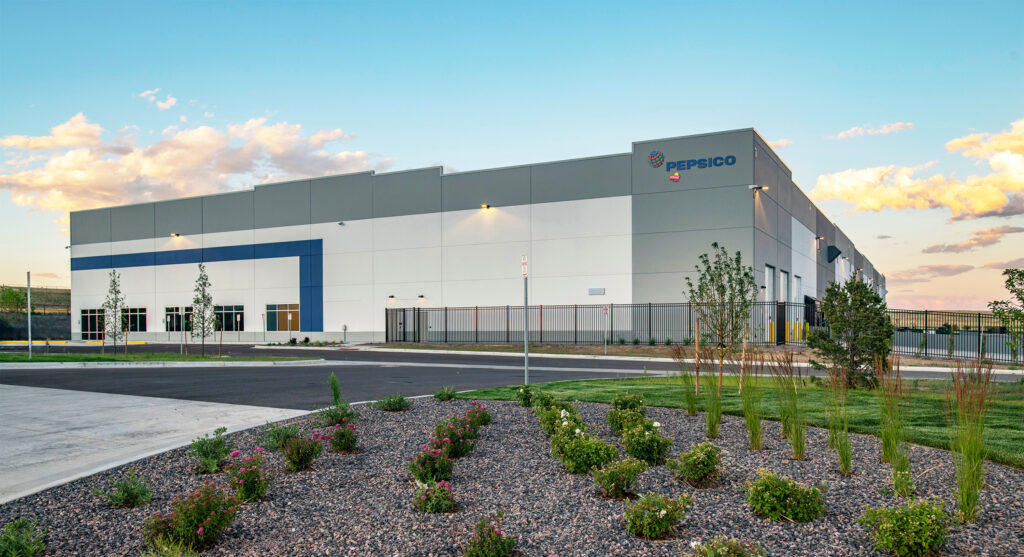By Wayne Heilman
Peak Innovation Park, the 2,300-acre business park the Colorado Springs Airport owns adjacent to its primary entrance, has become a major economic driver for the Colorado Springs area, generating $1.9 billion in economic activity, according to a new study.
The 33-page study, which the Denver office of Economic and Planning Systems Inc. completed earlier this year, estimates businesses and government agencies in the park will employ 7,415 people and generate an economic impact of $1.2 billion within five years. The study is based on tenants with operations in the park during late 2023, so it does not include two new tenants that began operations earlier this year.
The Oakland, Calif.-based consulting company, which specializes in real estate development market analysis, also estimated that businesses providing support to the park’s tenants employ 1,859 people with an economic impact of more than $350 million and that household spending by the park’s tenants, their suppliers and vendors generates another 2,450 jobs and an economic impact of nearly $370 million.
The park’s economic impact is responsible for nearly 5% of the $41.3 billion in economic activity produced during 2022 in the Colorado Springs area, as measured by the U.S. Bureau of Economic Analysis. The park’s economic activity is expected to more than triple, nearing $6.8 billion by the time the development is completed in 2040. By that time, the number of employees working in the park is expected to reach nearly 29,000, supporting another 15,000 jobs.
The study forecasts the park will generate up to $4.2 million a year from land sales and up to $6 million annually from land leases, which will benefit the airport and can be used to reduce airport fees or fund facility upgrades. Within five years, businesses in the park are expected to generate about $900,000 in annual tax revenue for the city and the Pikes Peak Rural Transportation Authority, with an expectation of nearly $4 million annually as development is completed.
“Peak Innovation Park is driving positive development in Colorado Springs, and specifically the Southeast area,” Colorado Springs Mayor Yemi Mobolade said in an emailed statement. “The increase of employment opportunities, coupled with the increase of diverse housing options in this part of our city, means current and future residents can enjoy the benefits of smart growth by living near their workplace.”
The business park now houses businesses employing more than 5,500 people, including distribution facilities for Amazon and Frito Lay, a sorting center and last-mile delivery station for Amazon, offices for defense contractor Northrop Grumman, research nonprofit Aerospace Corp. and cybersecurity provider Invictus International Consulting. Potential additional tenants are pending.
The airport has two parcels totaling 17 acres under contract to be sold as the sites for a 150,000-square-foot speculative two-building industrial complex. Both transactions are scheduled to be completed during the first quarter [0f 2025], says Troy Stover, the airport’s director of business park development. The park also hopes to announce plans for its first retail development early next year, near Amazon’s distribution center at Grinnell and Powers boulevards.
The retail development will include restaurants, shops and service businesses to serve park tenants and their employees who now must travel several miles for those services. The airport also plans a series of recreational amenities in the park, including a disc golf course to be built next year, as well as a bicycle park and trails, outdoor amphitheater, dog park, hiking trails and bocce and volleyball courts in the project’s later phases.

Frito-Lay and Invictus became the park’s newest tenants earlier this year. In August, Invictus opened the first of two planned facilities in Colorado Springs at the park’s Peak Technology Campus to provide on-site engineering and network support services to its clients. Frito-Lay opened its 104,500-square-foot distribution center in October, but no information is available on number of employees or what products the center distributes.
Peak Technology Campus is planned as a 210,000-square-foot office/industrial complex of four buildings designed for aerospace and defense tenants. Denver-based Flywheel Capital completed the first 50,000-square-foot building in 2021 and leased nearly 20,000 square feet to Invictus. The company also plans a pair of three-story office buildings on another nearby site. No timetable has been set for that project, though the study assumes completion within five years.
Construction could resume early next year on a two-hotel complex adjacent to the airport’s primary entrance on Milton E Proby Parkway, says Jim DiBiase, a partner in the project. Work on the first of two hotels halted in early 2023, after completion of the foundation, utilities and elevator shafts, when one of the project partners withdrew and the construction lender pulled out due to rising interest rates, surging inflation and other market conditions.
DiBiase expects to secure new financing soon for the $42 million project as interest rates continue declining, allowing construction to resume next spring on a 142-room Residence Inn by Marriott that would open about 13 months after work resumes. Construction on a second hotel, a Courtyard by Marriott, or another of the hotel giant’s brands with 125-130 rooms, would begin construction about a year after the first hotel opens and be completed within three years, he says.
Although the park was first envisioned in the 1990s and development began in 2006, Northrop Grumman and Aerospace Corp. were the only tenants for more than a decade as the Great Recession stalled development for several years. That changed when Amazon opened its last-mile delivery station in 2019 and acquired land for its distribution center months later, accelerating development and triggering renewed interest from potential tenants.
Development of the park is “ahead of schedule because of the entry of Amazon, but this is still a youthful business park” since most of Peak Innovation Park remains to be developed, Stover says. Metro districts the airport organized spent nearly $100 million — financed through bonds that are repaid by taxes from the park’s property owners — building roads, utilities and drainage improvements during the past six years.
About 18% of the park’s 1,600 acres have been developed, though nearly one-third of the 15 million square feet of buildings the property could accommodate have already been completed, Stover says. The park is adding another 700 acres adjacent to the airport’s east side during the next several years by acquiring 562 acres for $38 million and moving additional surplus airport property into Peak Innovation Park.
The park is included in several special zones that provide tax breaks to tenant businesses, including the Pikes Peak Enterprise Zone, a Commercial Aeronautical Zone, a federal Opportunity Zone and a Foreign Trade Zone that provides temporary exemption from import duties.
The additional land gives the airport control of property up to the west side of Marksheffel Boulevard, creating a buffer between the airport and likely residential development to the east, reducing potential resident noise concerns. The land also gives the airport control over access to Marksheffel Boulevard, a key transportation corridor on the city’s east side that could eventually be linked with Powers Boulevard on the airport’s east side.
The deal gives the airport “land for future growth and development and allows the airport to control land use” near its property, Stover says. That land could be used for business park development, airport improvements or by Peterson Space Force Base, he says.














